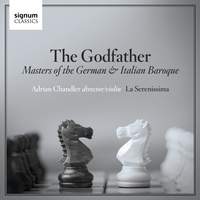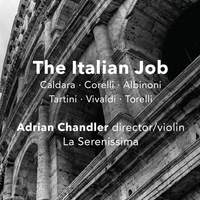Recording of the Week,
La Serenissima's The Godfather
La Serenissima continue their indulgent habit of naming albums after popular Italian-themed films; after The Italian Job we now have The Godfather. Fear not, though – this is no lurid, Red Priest-esque exploration of juicy criminality and scandal. Instead, we take a wander down the interconnected musical byways of eighteenth-century Europe, inspired by one particular historical godfather – Telemann, who fulfilled this role for JS Bach’s children. Their friendship is the jumping-off-point for an album that celebrates the close relationships between composers – both famous and less well-known – who helped to bring about the glorious fusion of German and Italianate styles which gives the late Baroque so much of its vitality. Various musical debts and borrowings are acknowledged, Adrian Chandler once again enjoying the opportunity to put some rarely-heard works front and centre.
 We open with a grandiose-sounding concerto grosso by the eponymous Godfather, where the concertante group features three trumpets and timpani and the mood is thrillingly martial. The opening two movements seem to form something close to a French-model overture when taken together, underlining Telemann’s famously cosmopolitan style and his ability to blend the various European schools together into a convincing whole that is greater than the sum of its parts.
We open with a grandiose-sounding concerto grosso by the eponymous Godfather, where the concertante group features three trumpets and timpani and the mood is thrillingly martial. The opening two movements seem to form something close to a French-model overture when taken together, underlining Telemann’s famously cosmopolitan style and his ability to blend the various European schools together into a convincing whole that is greater than the sum of its parts.
Three one-off “concerto movements” follow – two by Pisendel (including an unmistakeable nod to his friend JS Bach’s well-known double concerto) and one by Bach himself, this last an ensemble work with gloriously over-the-top scoring. The concertante group is even larger than Telemann’s, and crowned with a “soloist-among-soloists” violin part generally thought to have been written for Pisendel, in recognition both of the two men’s friendship and of Pisendel’s famously prodigious technique as a violinist. Here, it’s Chandler who takes on the Herculean task, taking no prisoners and not afraid to dig in and give the spikier passages some real edge with his bowing.
One work that particularly leaps out at the ear, initially simply for its sonority, is Brescianello’s double concerto for violin and bassoon. Not the most common combination, and it’s tempting to patronisingly dismiss it as a charming novelty and move on. However, the agility of Peter Whelan means that to skip over this work is to miss some of the best playing, and the best music, on the whole album. Absolutely undaunted by heavy-duty passagework, he refuses to be outdone by the violin either in nimbleness in the outer movements or in pathos in the central adagio, where both soloists seem to toil through a background of icy staccato strings in which Brescianello’s friendship with the Vivaldi of the Four Seasons is plainly audible.
The album comes to a close with a third martial D major concerto, here by Fasch, in which the trumpets and timpani return one last time to bring proceedings full circle. The very first bar sets out Fasch’s flamboyant stall, presenting a ritornello characterised by octave glissandi for the oboes and strings that conveys a sense of barely-contained exuberance exceeding even the other two similarly-scored works. Not even in the andante middle movement, a moment of relative calm, does the pace truly slacken, and before long the exultant mood of the opening returns, turned up another notch with soloist and ripieno groups both giving their all as the music powers home in a dizzying finale – all rounded off, like the cherry on a cake, with a glittering final top D from first trumpeter Simon Munday.
One of the many things that La Serenissima always do very well is to take what might seem a dry concept – tracing the thread of musical connections between the various parts of Europe via pieces by the composers who helped to cement them – and make it fun. Every one of their albums has had an irrepressible air of fun about it, and this one is no different. From cheeky, almost playfully teasing, opening statements of fugal subjects to blazes of glory for the percussion and brass (and not forgetting the bassoon’s finest hour), it’s clear that every member of the band cares as much as Chandler does about bringing these relatively unheard works to a wider audience. This enthusiasm can’t help but come through in their playing and the result is simply an offer you can’t refuse.
La Serenissima, Adrian Chandler
Available Formats: CD, MP3, FLAC, Hi-Res FLAC
Gail Hennessy, Rachel Chaplin (oboes) & Peter Whelan (bassoon), La Serenissima, Adrian Chandler
Available Formats: CD, MP3, FLAC, Hi-Res FLAC




